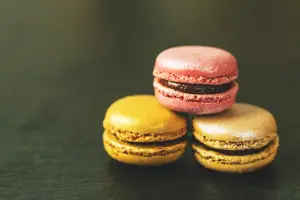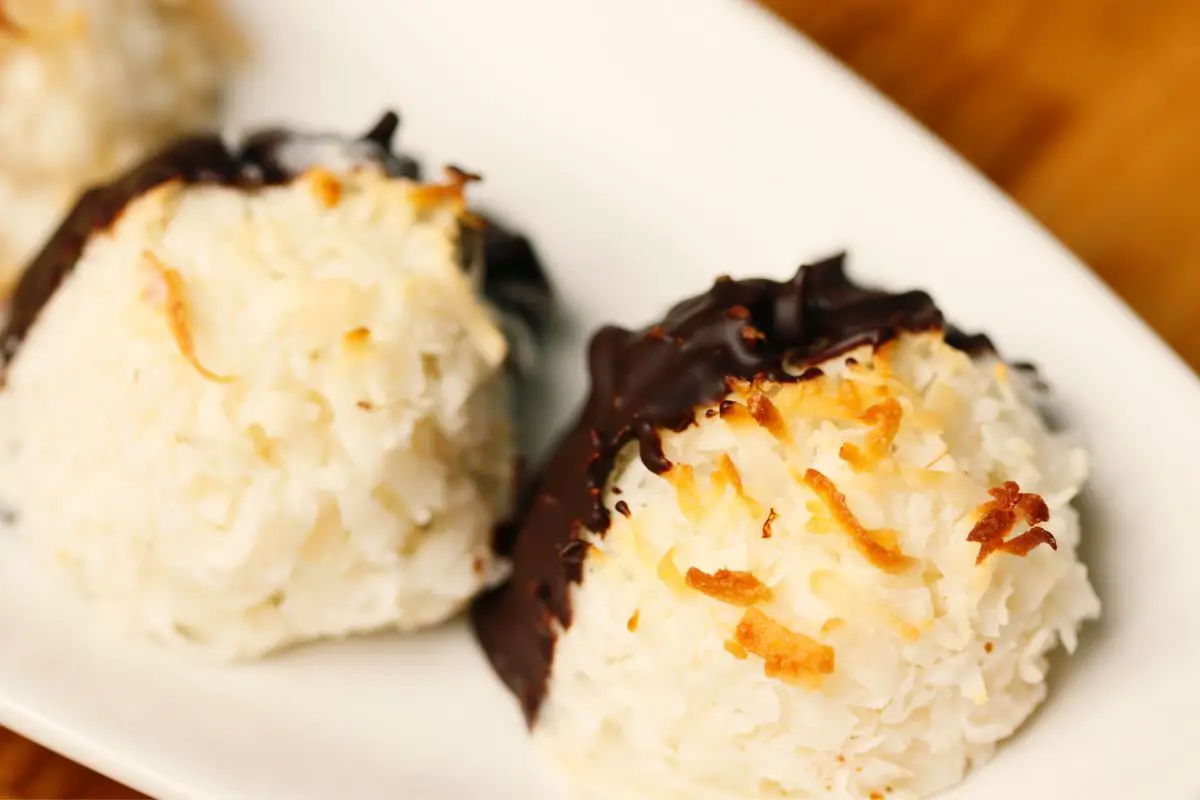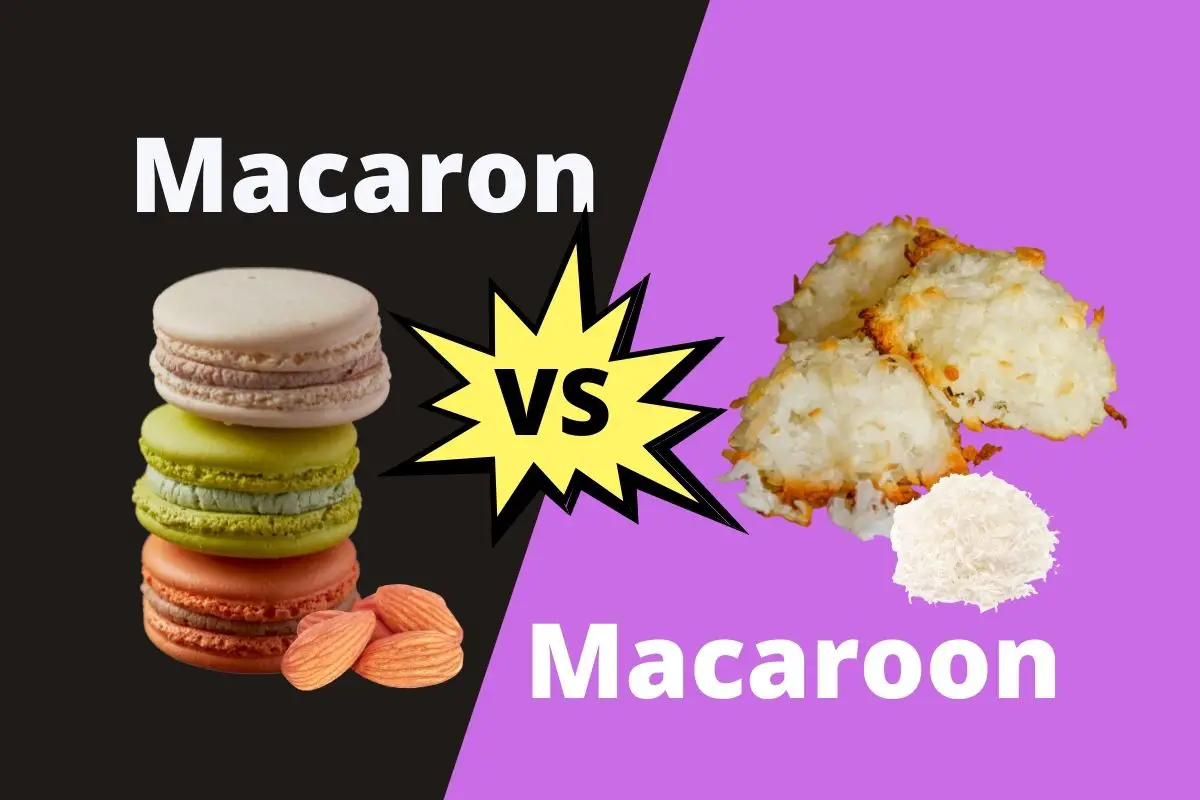Macarons are made with finely-ground, blanched almonds, while macaroons are made with sweetened flaked coconut. Both are made with egg whites, sugar, vanilla, and salt.
Macaron and macaroon are two words that sound alike. They’re both confections that stem from an Italian cookie made of egg white, almond, and sugar. When there are such similarities, there’s likely to be some confusion.
But besides these similarities, macarons and macaroons are quite distinctive desserts. Are you wondering what a macaron or macaroon is and how they are different? Keep reading to explore the critical differences between a macaron and a macaroon.
Table of Contents
What is a Macaron?
Macaron is a cookie sandwich consisting of egg whites, confectioners’ sugar, almond flour, and food coloring. Most significantly, it has a base of meringue. After baking, two cookies are sandwiched together along with various fillings such as jams, buttercream, etc. Macarons are aesthetic sandwich cookies with stunning colors. Chocolate, pistachio, rose, and salted caramel are among the traditional flavors of French macarons, which are light, fluffy, and colorful.
What characterizes these meringues are their smooth tops, edges with ruffles, and completely flat bottoms. They’re fluffy, moist, a little cakey, and a little chewy in texture. Macarons that have been appropriately cooked should ideally have a melt-in-your-mouth texture. The outside shell is crisp, the interior cookie is somewhat chewy, and the contents, according to the cookie, come in a range of fillings. You can also find colorful macarons tinted with food coloring to symbolize the flavor it represents.
Although the macaron’s origins aren’t entirely known, most people believe they were brought to France from Italy by Catherine de Medici when she married Henry II in the 1500s. Over time, French pastry cooks modified it, which evolved into the macarons we know now.

How to Make a Macaron
While the general approach is similar to that of coconut macarons, it is more time-consuming, and producing perfect macarons takes a lot of skill and experience. Macarons require finesse when it comes to baking and decorating them.
The French Approach
Making macarons is a meticulously exact skill, but the outcome is well worth the effort. There are two methods for making meringue: the French approach, which involves whipping egg whites until stiff peaks generate.
The Italian Method
The other is the Italian method, which involves whipping egg whites with simple syrup. Most current recipes use the French technique. You must fold the dry ingredients into the egg white mixture once the meringue is ready.
Then, you need to pipe the mixture into a baking sheet with a lining. Pipe into rounds and let it cool until a “skin” forms, usually taking about an hour. Cook these discs until they are firm. You will get the sandwiches once they cool down to room temperature.
You can then put different fillings as per your liking to make a complete sandwich. However, when preparing macarons, it’s critical to utilize correct measurements. They won’t come out just like the perfect sandwich cookies you’re anticipating if you don’t.
Tip: To ensure that all of your components are correctly measured, use a food scale.
What is a Macaroon?
The macaroon, pronounced mac-uh-roon, is a cookie one can prepare with grated coconut, beaten egg whites, and sugar. It’s a lighter kind of meringue than a macaron. There are specific recipes that call for ground, blanched almonds. However, the almonds need to be coarser than those used in macarons.
When it comes to making them, macaroons are more prominent, denser, and chewier than macarons. Yet, they are a lot easier to create. Sugar and vanilla flavor the coconut macaroons. However, the coconut flavor is the most prominent.
Because the coconut macaroon is thick, adding crushed dried fruit or chocolate to the batter is easy. Both dry fruits and chocolate are popular additions. Many people dip, drizzle, and glaze macarons in chocolate or other flavor additions like cinnamon and lemon.
Macaroons, like macarons, originated in Italy. The term for paste, maccherone, was renamed macaroon. Although almond cookies are rare in bakeries nowadays, they used to be the standard. Macaroons are a staple Passover delicacy in many Jewish families outside of Italy these days.
Macaroons are increasingly common and are available in many places. It could be unfair to suggest that coconut macaroons are the country relatives of French macarons. But, these two pastries have a connection despite their outward distinctions.

How to Make Macaroons
Macaroons are more straightforward to prepare than macarons due to the easy process and the attractiveness of their irregular, textured appearance. First, you must whip the egg whites and superfine sugar until stiff peaks form.
On the other hand, coconut macaroons are far less refined, though they make up for it with their unique charm and ease of preparation. Some bakers prefer to dress them up by dunking cooled cookies in molten chocolate or sprinkling it ornately over their tops. They do not need the finishing like macarons.
Then fold in the almond flour and confectioners’ sugar gradually. Add in your favorite food colors or flavors. Then, pipe this mixture onto silicone baking mats using a pastry bag. Allow the sheet pans to dry on the counter for 15 minutes to 1 hour, depending on humidity.
Let it form the dry and crispy skin on the top of the cookie and a small ruffle on the bottom. Bake the batch for about 20 minutes or until they are glossy and have risen. You can do other things while they bake and cool. Get busy preparing your favorite fillings to make the sandwiches you can enjoy!
Macarons vs Macaroons
| Macaron | vs. | Macaroon |
| mah-ka-ron | Pronunciation | mac-a-roon |
| Sandwich cookie piped into rounds with different fillings | Appearance | Irregular texture, often called coconut cookies. |
| It takes perfection and finesse to make a perfect macaron | Effort | Made with the drop cookie technique, does not require perfection |
| Has its origin in Italy but popular in France | Origin | Originated in Italy but quite popular in the Uk |
| Ground almonds, egg whites, and sugar | Ingredients | Coconut, egg whites, sugar, or sweetened condensed milk |
Taste the similarities and differences
Even though these cookies sound alike and may have similar origins, they’re actually quite different. They have different key ingredients and differ significantly in appearance and taste. Now that you know the differences between macarons and macaroons, you can try these recipes and taste the goodness for yourself.

